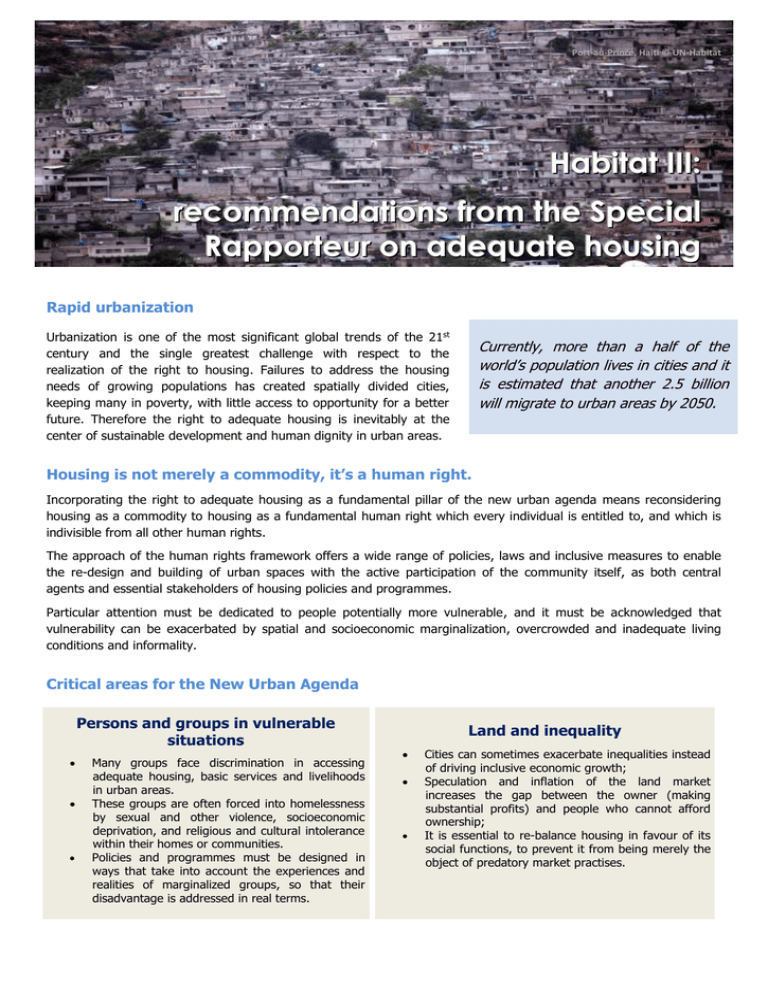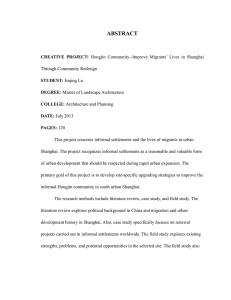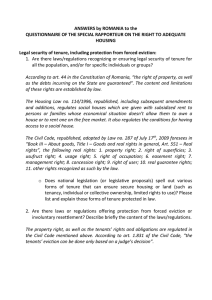H a b
advertisement

Port-au-Prince, Haiti © UN-Habitat Habitat III: recommendations from the Special Rapporteur on adequate housing Rapid urbanization Urbanization is one of the most significant global trends of the 21st century and the single greatest challenge with respect to the realization of the right to housing. Failures to address the housing needs of growing populations has created spatially divided cities, keeping many in poverty, with little access to opportunity for a better future. Therefore the right to adequate housing is inevitably at the center of sustainable development and human dignity in urban areas. Currently, more than a half of the world’s population lives in cities and it is estimated that another 2.5 billion will migrate to urban areas by 2050. Housing is not merely a commodity, it’s a human right. Incorporating the right to adequate housing as a fundamental pillar of the new urban agenda means reconsidering housing as a commodity to housing as a fundamental human right which every individual is entitled to, and which is indivisible from all other human rights. The approach of the human rights framework offers a wide range of policies, laws and inclusive measures to enable the re-design and building of urban spaces with the active participation of the community itself, as both central agents and essential stakeholders of housing policies and programmes. Particular attention must be dedicated to people potentially more vulnerable, and it must be acknowledged that vulnerability can be exacerbated by spatial and socioeconomic marginalization, overcrowded and inadequate living conditions and informality. Critical areas for the New Urban Agenda Persons and groups in vulnerable situations Many groups face discrimination in accessing adequate housing, basic services and livelihoods in urban areas. These groups are often forced into homelessness by sexual and other violence, socioeconomic deprivation, and religious and cultural intolerance within their homes or communities. Policies and programmes must be designed in ways that take into account the experiences and realities of marginalized groups, so that their disadvantage is addressed in real terms. Land and inequality Cities can sometimes exacerbate inequalities instead of driving inclusive economic growth; Speculation and inflation of the land market increases the gap between the owner (making substantial profits) and people who cannot afford ownership; It is essential to re-balance housing in favour of its social functions, to prevent it from being merely the object of predatory market practises. Social exclusion Migration and displacement Focus on eliminating the social exclusion, inequality, discrimination and stigmatization of people on the basis of their housing status; Public spaces have become very contested, and are often designed to drive out homeless people who do not have alternative places to stay; Governments lack long-term strategies to ensure adequate housing provision. Housing for migrants and internally displaced persons is primarily located in cities; These groups are often treated as outsiders, and are victims of xenophobia and discrimination; They are routinely excluded from decision-making processes and from subsidized housing programmes. Informal settlements Around one quarter of the world’s urban population live in informal settlements; The consequence is a lack of almost every human right: safety and security, clean running water, sanitation and other services including electricity. Instead, those living in informal settlements face overcrowding, houses overrun by rodents, lack of garbage disposal, open defecation, structurally unstable homes and the constant fear of forced eviction; A correct approach by local and national governments would be to include these persons in urban decisionmaking and planning processes. Key recommendations The urban rights agenda should: Elaborate, concretize and give meaning to target 11.1 of the 2030 Agenda for Sustainable Development regarding access to adequate housing, while safeguarding its vital link to binding international human rights obligations Articulate the responsibilities of national and local governments to ensure the realization of the right to adequate housing in accordance with international human rights law Focus on eliminating social exclusion, inequality and discrimination as human rights violations, and prevent the criminalization and stigmatization of people on the basis of their housing status Firmly commit to the elimination of homelessness and forced evictions, as two of the most serious systemic violations of the right to housing in cities Commit to enhanced regulation of private actors and markets consistent with the recognition of housing as a human right Incorporate the lived experience and priorities of urban inhabitants in decision-making through the establishment of a process of ongoing participation and engagement Ensure incorporation of the right to adequate housing and other human rights as paramount elements of all urban law, policy and programmes, including fiscal policy, resource allocation and land management Commit to ensuring security of tenure for all households, including all residents of informal settlements Clarify the responsibilities of States in relation to international cooperation and assistance, as well as extraterritorial activities affecting the right to adequate housing in cities The full report of the United Nations Special Rapporteur on the right to adequate housing, Ms. Leilani Farha (A/70/270) is available in all UN languages: http://www.ohchr.org/EN/Issues/Housing/Pages/AnnualReports.aspx



